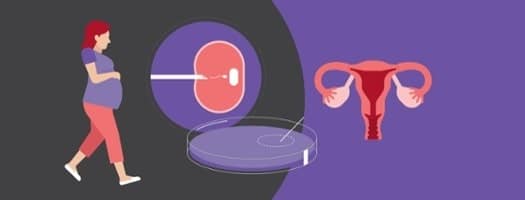The opportunity of success with IVF remedies relies upon upon some of factors, inclusive of the age of the female, the purpose of infertility, the first-rate of eggs retrieved and the excellent of the semen.
The success rate of an IVF treatment depends upon some factors, inclusive of the age of the woman, the matter of infertility, the quality of the eggs, and the sperm motility of the male partner.
One of the most consistent factors that affect ovarian reserve is the age of the woman. This is because a woman is born with all the eggs she can ever have. In most girls in their 20s approximately 3/four of the eggs are genetically normal. However, there could be some which might be genetically abnormal. It seems that the quality eggs are ovulated first.
As the age increases, woman’s eggs quality take a rain check. Yes, the egg quality starts to decline as the age of the woman moves-up. At age 35, approximately 50-60% of eggs are chromosomally normal, at age 40 about 20-30% and then a great deal fewer after that. Therefore, in older women fewer ordinary embryos are available for implantation into the uterus. Hence, healthy women over 35 are much less fertile than those who are below 35. Women at 40 and over may additionally have most effective a 20-35% or lower live birth rate with IVF method using their very own eggs, despite the fact that numerous embryos are changed into the uterus.
If the woman wants to conceive by the technique of third-party ART such as IVF with donor egg or donor embryo, then the success rate to achieve pregnancy is high (because of the quality medical components by the donors).
The main factors affecting IVF outcome include the following:
- age of the woman (and consequently, her ovarian reserve)
- normalcy of the uterus, and semen quality
- success or failure of fertilization and cleavage in vitro
- number of embryos transferred and cryopreserved
- adequacy of the luteal phase after transfer
In addition, success rates increase as the number of IVF stimulation attempts increase, probably ranging to a maximum of three to four stimulation cycles.
IVF Success Rate (self-eggs) by the team of We Care IVF Surrogacy –
| Female age | Live birth rate per retrieval |
| < 35 | 57.3% |
| 35-37 | 45.7% |
| 38-40 | 31.6% |
| 41-42 | 20.6% |
| > 42 | 13.4% |
IVF Success Rate – with Donor egg performed cases by the team of We Care IVF Surrogacy
| IVF Treatment type | Live birth per transfer |
| Donor eggs | 65.7% |
Success Rate for Your First IVF Cycle
What to Do After a Failed Cycle of IVF
IVF Failed – What Next for Success With the Second IVF Attempt?
Why Does IVF Fail and What Can the Fertility Specialist Clinic do to Increase the Chance for Success on a Second IVF?
A first IVF cycle is often successful at a high quality program. Unfortunately, many couples will not have successful first cycle IVF results and will need to consider a second cycle of in vitro fertilization. So what should be next after one failed IVF cycle? Let a week or so pass in order to make the difficult adjustment to the devastating news that your cycle did not succeed. When you feel ready, schedule a consultation with your IVF specialist to go over what might have been learned from the failed IVF attempt. A very important consideration should be whether to change IVF doctors or switch to a different IVF clinic at that point. In vitro fertilization programs are not all equal – some give a much higher chance for success than others.
The first thing that should happen is for the IVF specialist physician to review the failed cycle carefully to possibly learn something from the results of the IVF ovarian stimulation process, or from any issues with egg retrieval, egg quality and/or quantity, fertilization results, embryo development, or any problems with the embryo transfer procedure. Often there will be an issue in one or more of these areas. The ovarian stimulation protocol and results as well as the embryo development issues should be discussed with the couple. Pictures of the embryos and quality scoring issues, including cell stages, fragmentation and regularity of the cells in day 3 transfer cases, or blastocyst grading and expansion scoring for day 5 transfer cases – should also be reviewed and discussed. Then a plan for a second IVF cycle can be formulated.
Inefficiencies in the IVF process will not always be issues that are “fixable” – but they should be studied and discussed with the couple so that they are educated about their situation and their estimated success rates for a second IVF attempt. Many issues seen in a failed first IVF attempt can be addressed in some manner in order to eliminate or reduce the likelihood of the same issue occurring in a second try with in vitro fertilization.
What is the Reason That IVF Fails?
If there is an embryo transfer done, the reason that IVF fails is because of implantation failure. However, that is not very helpful at all. We know that the embryos were transferred to the uterine cavity – particularly if ultrasound guided embryo transfer is done. When IVF fails there was implantation failure, but we do not know whether the failure to implant was due to a problem with the embryos or a problem with the uterus. Most fertility specialists believe that in more than 95% of IVF failures it is due to arrest of the embryos.
This is quite often due to chromosomal or other genetic abnormalities in those embryos that made them too “weak” to continue normal development and implantation. Unfortunately, these issues are mostly a “black box” at the present time – we do not have a safe and cost-effective technology currently that would allow us to investigate the chromosomal and/or genetic issues in a manner that does not damage the normal embryos significantly. PGS or PGD can be used to investigate chromosomal abnormalities in IVF embryos, but has been shown in well-controlled studies to lower chances for pregnancy rather than improving them. Learn more about PGD for chromosomal abnormalities (aneuploidy) in IVF.
What is The Success Rate With a Second Cycle of IVF?
Couples often ask this very reasonable question. However, there is not a good, short answer. Many couples will have a successful second IVF. The chances for that happening depend on many factors, including:
- Age of the female partner
- Egg quality and egg quantity
- Sperm quality
- Quality of the IVF ovarian stimulation – dependent on the skills of the physician controlling this process
- IVF lab quality
- Egg retrieval skills of the physician and overall efficiency of the egg pickup process
- Embryo transfer skills of your IVF doctor and ultrasound equipment and technician
- Number of eggs retrieved
- The cause of your infertility
- Uterine issues
- Embryo developmental rates, embryo quality, and rates of embryonic arrest during development in the lab
- Genetic and chromosomal competence of the embryos
In order to maximize the chances for a successful second IVF try make sure that your doctor has carefully reviewed the issues above. You might also consider changing doctors between IVF cycles. Some reproductive endocrinologists (infertility and IVF specialists) are pulled in many different directions and are not focused on IVF or on having the best possible IVF lab and clinic. Having an outstanding IVF program requires constant diligence and consistent execution. This is not an easy proposition – particularly in very large IVF clinic – where thousands of couples are pushed through annually in a mass production approach. That approach to IVF works much better for the clinic than it does for the eggs, the embryos, or the infertile couples there.
IVF Failed – What Next?
Overall, IVF success rates are about the same on the average for second attempts as compared to first IVF tries. Couples with the best egg quality are more likely to get pregnant on their first try, but this is balanced out to some extent by learning from the first failed cycle and making some adjustments to maximize success for the second in vitro fertilization attempt.
No worries even if you have first or second IVF fails, there are several treatments associated with IVF only – called as advanced IVF technique. You must be wondering what IVF is advanced course; advanced IVF consists of methodologies and performed when the couple is unable to get a positive outcome by conventional IVF process.
Take an instance when a woman is unable to get successful result by standard IVF process; this could be of two reasons – due to the poor egg quality of the woman and the second is of partner’s sperm motility. At such condition, the specialist suggests the couple to either go for IVF with donor egg (if the quality of egg is the root cause) or IVF with ICSI/IMSI/ PICSI and other advanced procedures based on the fertility type.
Who We Are?
We are one of the fertility service providers – a fertility agency that puts forward all types of fertility treatment, such as IUI, IVF, IMSI, PICSI, Surgical Sperm Retrieval, and so on. We also offer surrogacy packages in some countries (as per the surrogacy laws concerning states). The entire process and fertility treatments are served by the world-class fertility team consisting of the lab technicians, junior fertility doctor, senior fertility specialist, embryologists, and the knowledgeable and skilled coordinators.
We Care IVF Surrogacy is always been an eminent name providing basic and advanced fertility treatments across the globe. With a decent success rate, this fertility agency promises the couple to get the best experience throughout their treatment.
For any query associated to the fertility issues, you can directly contact our We Care support team!




